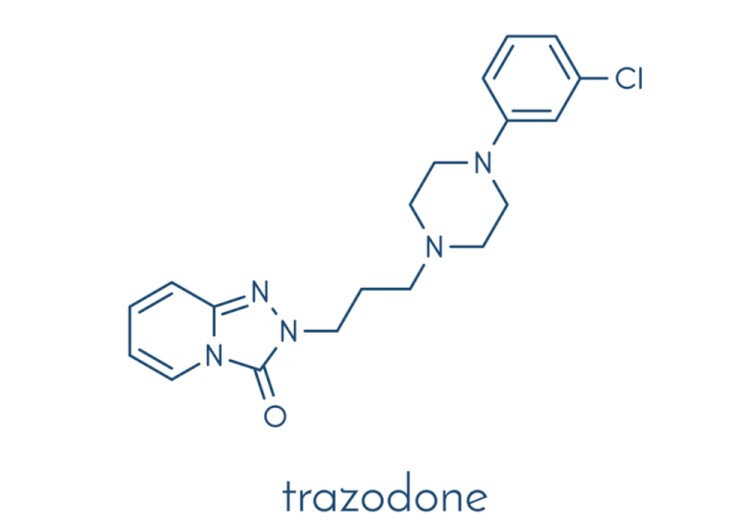Jane asked
I've been on 50 mg of trazodone a day for 2 months for sleep. It stopped working. Can I just stop taking it?
At a glance
- Most sources, including the prescribing information for trazodone, recommend not stopping the drug abruptly when discontinuing. Instead, a gradual dose reduction over time is recommended to reduce potential withdrawal symptoms from occurring.
Answer

In most cases, you should not stop trazodone abruptly. Doing so greatly increases the risk of withdrawal reactions, which can include:
- Nausea
- Anxiety
- Agitation
- Rebound of the condition being treated
- Sleep disturbances
- Sweating
- Dysphoric mood
- Irritability
- Dizziness
- Sensory disturbances
- Tremor
- Confusion
- Headache
- Lethargy
- Ringing of the ears
- Seizures
Even the prescribing information for the drug recommends gradual discontinuation:
Advise patients not to abruptly discontinue DESYREL [trazodone] and to discuss any tapering regimen with their healthcare provider. Adverse reactions can occur when DESYREL is discontinued.
There is no single tapering recommendation or protocol that covers all patients. There are many factors that have to be taken into consideration when coming up with an appropriate tapering regimen, which includes:
- How long you have been taking the drug
- The condition you are treating
- The dose you have been taking
- Other disease states you have
Taking into account the reason you are taking trazodone is very important.
While trazodone is only FDA-approved from the treatment of depression, it is very often prescribed 'off-label' for the treatment of insomnia as well due to its sedating effects. In fact, it is likely that trazodone is more likely to be prescribed for insomnia than as an antidepressant.
The 'Guidelines for the Treatment of Major Depressive Disorder' discuss this:
Trazodone is the oldest medication from this group that is still in wide use. Although trazodone is an effective antidepressant, relative to placebo, in contemporary practice it is much more likely to be used in lower doses as a sedative-hypnotic than as an antidepressant.
When used for insomnia (i.e. to help you fall asleep), the doses used are generally lower than those that are used for depression. This likely will make it easier to discontinue as withdrawal symptoms tend to be less severe when lower doses have been used.
Nevertheless, withdrawal symptoms can happen to anyone, especially if you have been taking the drug over four to six weeks (which you have).
Therefore, be sure to check with your doctor about a tapering regimen that will be appropriate for your specific medical situation.
Why Trazodone Needs Tapering

Trazodone, while chemically unrelated to other antidepressants, works in a similar manner to SSRIs, by inhibiting the reuptake of serotonin.
It also appears to have additional, somewhat complex actions on serotonin receptors. Studies show that at low doses, it acts as a serotonin antagonist but at higher doses, it acts as a serotonin agonist.
In addition, the sedative effects of the drug are attributed to the fact that it has alpha-adrenergic blocking actions and may also affect histamine.
All antidepressants have been associated with withdrawal symptoms, which are sometimes collectively referred to a 'discontinuation syndrome'.
With SSRI drugs, in particular, potential withdrawal symptoms have been well documented and are often noted by the acronym FINISH:
- Flu-like symptoms
- Insomnia
- Nausea
- Imbalance
- Sensory disturbances
- Hyperarousal
The documented withdrawal symptoms of trazodone are similar to SSRI drugs and just like SSRIs, tapering to prevent a withdrawal syndrome is recommended.
How To Taper?
It is also important to know that tapering may not eliminate the risk of withdrawal symptoms occurring. It should, however, significantly reduce their severity.
If they do occur, they can begin in as little as a few days from the time you start your dose reduction and can last from days to weeks.
As mentioned in the 'Overview' section, there is no single recommended tapering approach that will cover all individuals.
One study recommends a tapering duration of around four weeks if you have been taking the drug for more than six weeks. This would equate to about a 25% dose reduction on a weekly basis.
If you are taking a low dose of trazodone to help you sleep at night, you may be able to be a bit more aggressive in how quickly you decrease your dose. Be sure to speak with your doctor about a regimen that works for you!
References
- Trazodone Monograph. AccessFDA
- Practice Guidelines for the Treatment of Major Depressive Disorder. Psychiatry Online
- Pharmacotherapy of mood disorders and treatment discontinuation. PubMed
- Mechanisms of the development of trazodone withdrawal symptoms. PubMed




